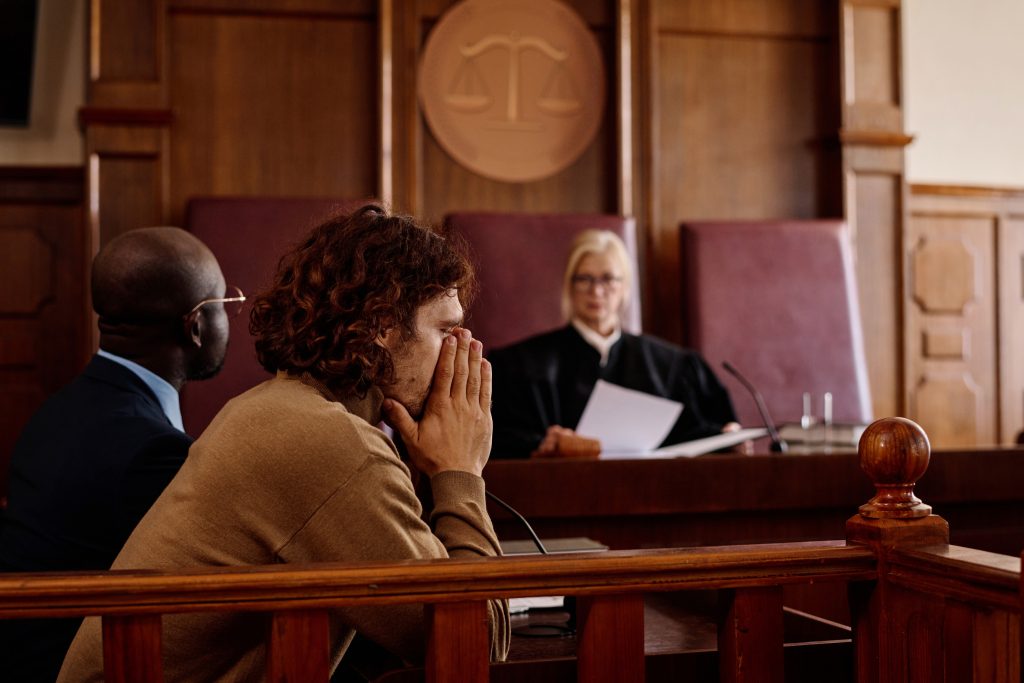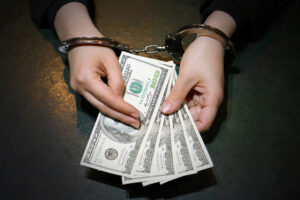Bail is a fundamental right in many legal systems, allowing those accused of crimes to be released from jail pending their trial. The goal of bail is to ensure that the accused returns to court for their trial without unnecessarily punishing them before they are proven guilty.
However, in certain cases, a judge may deny bail or set it at an unaffordable amount. This decision is typically made based on various legal criteria that aim to protect public safety, ensure the defendant’s appearance at trial, and uphold the integrity of the judicial process. (Read our guide to what mistakes to avoid during an arrest.)
Here are several common reasons why bail can be denied:
1. Risk of Flight (Fleeing the Jurisdiction)
One of the primary reasons a judge may deny bail is if there is a significant risk that the defendant will flee the jurisdiction to avoid prosecution. This is particularly true for the defendants facing serious charges, those who have a history of flight, or those with strong ties to another country. Factors like foreign citizenship, a history of traveling or living abroad, or a lack of community ties can all increase the perceived risk of flight. If the defendant is considered likely to escape the legal process, the judge may opt to deny bail entirely or impose strict conditions.
2. Seriousness of the Offense
The severity of the charges against the defendant is another critical factor. For those accused of serious or violent crimes — such as murder, rape, or armed robbery — there may be a presumption that they pose a significant threat to public safety. In these cases, the judge may feel that releasing the defendant on bail would endanger the community or undermine the integrity of the judicial system. Bail may be denied to prevent further harm or to ensure the defendant remains in custody while awaiting trial.
3. Risk to Public Safety
In addition to the nature of the crime, the judge may assess whether the defendant poses an ongoing threat to public safety. For example, if the defendant has a history of violent behavior, is accused of committing violence in the past, or has made threats during the investigation or arrest, a judge might deny bail to prevent further harm. This is especially common in cases involving domestic violence, drug trafficking, or gang-related activities, where the defendant may be seen as a danger to specific individuals or the community at large.
4. Prior Criminal Record
A defendant’s criminal history can heavily influence the decision to grant or deny bail. If the accused has prior convictions for similar offenses, especially serious or violent crimes, a judge may view them as more likely to reoffend. A history of failing to comply with previous court orders, such as violating probation, parole, or bail conditions, can also contribute to the denial of bail. A pattern of criminal behavior may indicate that the defendant is unlikely to respect the court’s proceedings, which may lead to bail being denied.
5. Failure to Appear in Previous Cases
A defendant who has previously failed to appear in court for scheduled hearings or trials may be denied bail in subsequent cases. Failing to appear is often considered a violation of trust between the defendant and the court. If there is a history of skipping court dates or not following the terms of a previous bail agreement, the court may decide that the defendant is not trustworthy enough to be released.
6. Public Outcry or High-Profile Cases
In some high-profile cases, especially those involving significant public attention, there may be a greater likelihood of bail being denied. Public pressure or outcry regarding the seriousness of the charges or the perceived danger posed by the defendant can sometimes influence a judge’s decision. In such cases, judges may err on the side of caution, especially if there is a concern that granting bail could lead to public unrest or further harm.
7. Pending Investigations or Multiple Charges
When a defendant is facing multiple charges, particularly in complex cases involving organized crime or widespread criminal activity, the judge may decide that releasing the defendant could interfere with ongoing investigations. Additionally, if the defendant is believed to be involved in multiple criminal activities or conspiracies, the risk of further crimes being committed while out on bail can be a deciding factor in denying release.
8. Inability to Meet Bail Conditions
Even when bail is set, a defendant can still be denied release if they are unable to meet the conditions set by the court. For example, the court may require the defendant to pay a certain amount of money, wear an ankle bracelet, or adhere to curfews or travel restrictions. If the defendant cannot meet these financial or logistical requirements, they may remain in custody until their trial. In cases where bail is set high to ensure the defendant’s appearance at trial, the inability to post bail can effectively act as a denial of release.
9. Mental Health and Addiction Issues
Defendants suffering from severe mental health issues or substance addiction may also face bail denial, especially if their condition makes them a danger to themselves or others. In cases where the defendant is considered to be a flight risk due to impaired judgment or an inability to comply with bail conditions due to addiction or untreated mental illness, a judge may decide that the risks outweigh the benefits of release. In some cases, the court may require the defendant to undergo a mental health or addiction assessment to determine whether they are fit to be released.
10. Probation or Parole Violations
If the defendant is currently on probation or parole and is arrested for a new crime, they may be denied bail due to the violation of their release terms. In cases where the defendant is already on a form of supervised release and has committed a new offense, the judge may conclude that the defendant is not trustworthy and poses a greater risk of further violations, making it inappropriate to release them on bail.
The Bottom Line
The decision to grant or deny bail is a complex process that considers various factors, including the severity of the crime, the defendant’s criminal history, and the risks they pose to public safety or the judicial process. Judges have a duty to balance the rights of the accused with the need to protect society and ensure that justice is served.
While the presumption of innocence is a cornerstone of the legal system, bail can be denied when there are legitimate concerns about flight, public safety, or the integrity of the trial process. Understanding these factors helps clarify the circumstances under which bail may not be granted and highlights the role of the courts in maintaining a fair and orderly justice system.
About Affordabail
Affordabail is a local bonding company. With several locations throughout the state of Louisiana, we service St. Tammany Parish Jail in Covington, Livingston Parish Jail in Livingston, Jefferson Parish Jail in Gretna, Tangipahoa Parish Jail in Amite, St. John Parish Jail in Laplace, and many more.
For more than 20 years in the industry, Affordabail Bail Bonds has been providing both families and individuals with expedient and efficient bail service. We are reliable at any time, day or night. We are always here for our clients and we treat people who require bail as people, not criminals. There is no way of knowing the circumstances behind what has happened to an accused, and we firmly believe in “innocent until proven guilty.” This respectful approach to our clients is part of what makes Affordabail better than the competition.
We process all bond payments securely, and our friendly staff is efficient and hardworking, getting all the required paperwork done as quickly as possible. We do not want loved ones to stay in custody longer than necessary. Our bail bondsman will make the entire process of obtaining bail simple and painless. Let industry knowledge work for you.
We offer payment plans, too. For more details on the types of bail bonds we offer, and to get started, call any of our locations, or fill out an online form.




